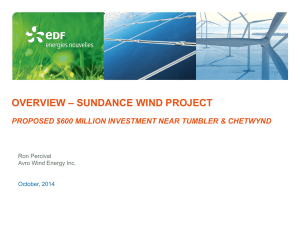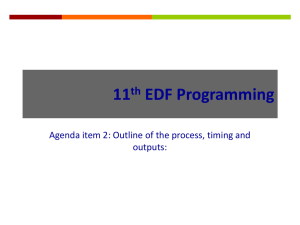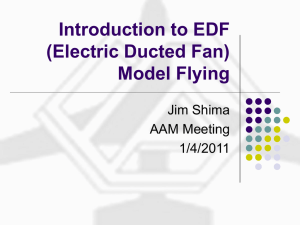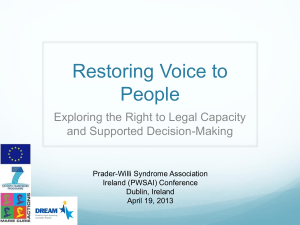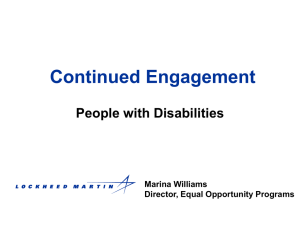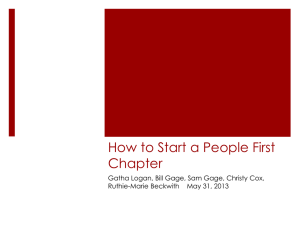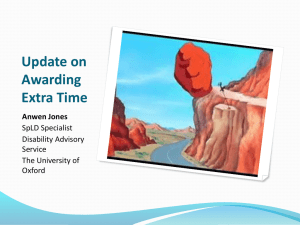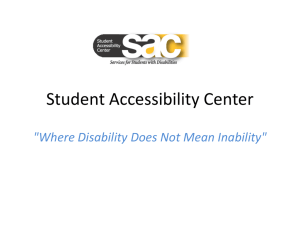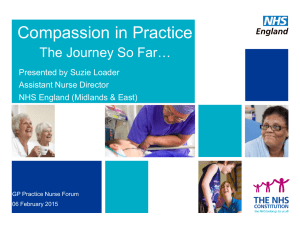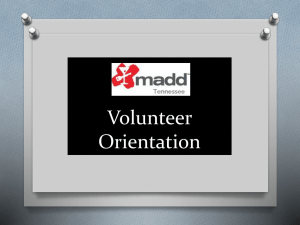EDF Work priorities 2014
advertisement
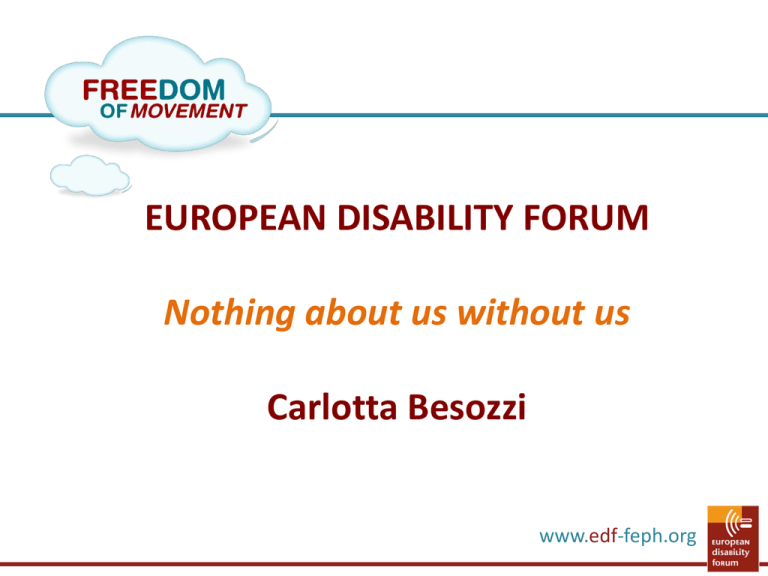
EUROPEAN DISABILITY FORUM Nothing about us without us Carlotta Besozzi www.edf-feph.org Our history - - HELIOS II (1993-1996)- European Community Action Programme for people with disabilities creates EDF 1996 – EDF established as an independent organisation by national councils and European NGOs & 2000-2003: non discrimination legislation & European Year of persons with disabilities with first action plan 2004 – 2007 enlargement with 10-12 new national councils 2007 - review of constitution: - - Review of EDF governing structures national members from all over Europe 2002-2007 negotiation & adoption of the UN CRPD & COE action plan 2008 1million4disability campaign 2008- today Membership of IDA & international work 2011-2013: EU concludes the UN CRPD & EU framework established Who are we? Vision A society that includes pwd is a better society for everyone Values • human rights • equal opportunities • non-discrimination Mission • guarantee fundamental rights • promote active participation for persons with disabilities Values on which our work is based • Self-advocacy: we are an organisation of persons with disabilities and their families • Involvement: nothing about us without us • Independence: we make sure that our organisation remains independent, and that our members decide upon the EDF work and positions. • Visibility: we demand that the rights persons with disabilities are visible in all sectors of life. • Inclusion: we fight for the inclusion of persons with disabilities in all aspects of the society. • Solidarity: we work to build a stronger and more united disability movement. • Partnership: we build alliances with other organisations which share our goals and help us to promote the rights of persons with disabilities. A strong network • Supporting a two-way communication flow in order to develop effective campaigns at EU and national level; • Shaping work and campaigns at EU level through their ideas and experiences, and translating contributions into concrete proposals to the EU decision-makers; • Supporting exchange of experiences and practices; • Providing trainings on specific areas fostering cooperation among them; • Providing regular information tools on the latest EU developments on disability issues (members’ mailing, publications, members’ only website etc) as well as communication tools, which can be used by EDF members in their own work; • Developing capacity building projects to empower and structure disability organisations where needed. Our members Our members More than 100 organisations • Full members : • national councils from EEA & European NGOs • Composed & run by a majority of persons with disabilities • Ordinary members: – European NGOs for persons with disabilities • Observer members – National councils from the rest of Europe • Associate members: – European, national, regional organisations Our members Our structure • Full members & Ordinary members – FORM Annual General Assembly – ELECT every 4 years: President, Board & procedural committees • The Board elects the Executive Committee & appoints and supervises advisory bodies • Observer members attend AGA + Board & Associate members attend AGA • All governing bodies are chaired by the President • The Secretariat implements the work What does EDF President do? • chairs the meetings of the General Assembly, the Board of Directors and the Executive Committee. • Organises, on behalf of the Executive Committee, the representation of the Association at external meetings and events. • Supervises, on behalf of the Executive Committee, the activities of the Secretariat • Takes decisions on matters of urgency What does EDF EXEC do? • Is responsible for the daily management of EDF • Decides on the representation of the Association at external meetings and events; • Appoints and supervises Secretariat; • Takes over tasks of the Board in between meetings in case of urgency; • Has other powers that are conferred by the GA or Board and minuted • Chairs advisory bodies (except youth Committee) • Has responsibilities in a number of policy areas (see EXEC committee report) What does EDF board do? • Acts in the common interest of the Association and of the whole membership of the Association. • • • • Is the key link with EDF constituency Decides by consensus and meets 3 times a year Is accountable to the General Assembly Prepares the draft annual work plan; • • • Prepares the draft annual budget and accounts; Supervises the daily management of EDF and manages EDF; Supervises the management of the finances of EDF in conformity with the budget; Supervises the work of the Secretariat Supervises the co-operation between the Association and third parties; Supervises the external relations of the Association; Decides on the membership of EDF to other organisations; Approves membership applications and excludes members; Is responsible for Committees Has all other powers given by the GA • • • • • • • What does EDF Secretariat do? • Implements the broad policy decisions made by the governing bodies. • Performs the day-to-day tasks/administration; • Coordinates and implements the annual work programme; • Coordinates and implements the decisions of the Executive Committee; • Assists the Executive Committee, and in particular the President; • Organises the meetings of EDF • Represents EDF within specific tasks. • Is accountable to the Executive Committee. • The Director coordinates the work of the Secretariat and represents the Association externally in its daily management What does EDF Secretariat do? • Director: Carlotta Besozzi: Community based services • Deputy Director: Javier Güemes : International Cooperation and IDA • Virginie Niyonzima: assistant to the Director (& Executive Committee) • Etienne Cuche: Parliamentary Officer (Youth) • Simona Giarratano: social policy Officer. • An-Sofie Leenknecht: Human rights officer (women) • Marie Denninghaus: Mobility & Transport • Alejandro Moledo: New technologies & Research Officer (Nadège Riche) • Lila Sylviti: Communication Officer • Muriel Da Via: Finance Officer • Ann Vervaecke: Event Officer How do we work? 15.000 lobbyists • • • • 2.600 interest groups EU institutions monitor EU initiatives to mainstream disability rights propose new legislation and policies Provide expertise to decision makers Partner with organisations EDF Work priorities 2014 EDF is currently running 4 top campaigns: Observatory of the crisis UN CRPD Campaign on Freedom of Movement European elections EDF Work priorities 2014 top campaigns Observatory of the crisis • • • • • The Economic crisis in the EU is having devastating effects on persons with disabilities. EDF has created the EDF observatory on the impact of the economic crisis on the rights of persons with disabilities. The Observatory monitors, through collection of examples by EDF members, measures taken by EU member states, European Union institutions and International financial institutions. EDF Board has also issued recommendations to the EU institutions on a Social investment pack EDF has made the crisis a central issue of the European Parliament of persons with disabilities in December 2012 EDF Work priorities 2014 top campaigns UN Convention on the rights of Persons with disabilities Full enjoyment of all Convention rights by all persons with disabilities in Europe is the overarching objective of all EDF work. The letter and the spirit of the Convention guides our strategy, annual work programmes as well as individual policy areas and projects that we promote. Our work on the UN CRPD is fivefold: 1. Work within the EU framework – the independent mechanism that has been created at EU level, in compliance with article 33.2, to promote, protect and monitor the implementation of the CRPD. Following a successful advocacy, EDF has ensured that it is a full a full member of the Framework. EDF has recently been nominated as Chair of the EU Framework. EDF Work priorities 2014 top campaigns UN Convention on the rights of Persons with disabilities • • • • • • EDF is advocating for a full and unconditional implementation of the UN CRPD The EU must change the way it deals with Human rights policies, enacts legislation and policies and manages its own institutions. EDF had a first meeting with the Director-Generals of European Commission services on the CRPD, and is looking at a similar meeting with the Council of the EU. EDF is also pushing for the creation of a task Force on the CRPD at the European Parliament. EDF is constantly lobbying to make sure that individual CRPD articles are taken into consideration by the EU while designing and implementing legislation, programmes and policies. For example, EDF relies on Article 9 “Accessibility” and 19 “Living independently and being included in the community” during its advocacy work on the European Structural Funds,. EDF Work priorities 2014 top campaigns UN Convention on the rights of Persons with disabilities • EDF is supporting its members in their efforts to implement the Convention at the national level. • EDF organises capacity building, trainings and seminars to improve members’ understanding of UN CRPD and facilitate their exchanges with the UN CRPD Committee using expertise from members. • EDF is also working on a parallel report to the UN CRPD Committee for the implementation of the Convention by the EU. EDF Work priorities 2014 top campaigns Freedom of movement and web accessibility • EDF advocates for the removal of barriers that prevent persons with disabilities from being able to work, establish themselves, study and travel and have easy access to goods and services across the EU • EDF has engaged in intense advocacy work on: • the European Accessibility Act, • the proposed directive on the accessibility of public sector bodies’ websites • the European Mobility Card. • In 2012, EDF has produced the Freedom Guide – a comprehensive, detailed and essential advocacy tool to show barriers faced by persons with disabilities. EDF Work priorities 2014 top campaigns The European elections to ensure that disability is on the campaign agenda to influence the candidates to the European Parliament as well as the establishment of the new European Commission. • The Board adopted a manifesto in May for political parties calling for: • • • Accessible elections Candidates with disabilities Political programmes including disability rights • Meeting in June with EP political parties leaders with joint declaration • Preparation of a new manifesto and campaign strategy EDF Work priorities 2014 EDF work programme 2014 Besides the campaigns, EDF will work to mainstream disability rights in : 1.Effective Protection against Discrimination (incl. the advocacy for the adoption of the equal treatment directive) 2. Fundamental rights and justice: Access to justice and procedural safeguards; civil protection and emergency management 3. International and development cooperation EDF Work priorities 2014 EDF work programme 2014 4. Social inclusion (which will include work on employment, education, Access to Social Services, taxation and Structural and Investment Funds) 5. Transport 6. Built environment 7. Consumer issues 8. research and innovation 9. contribution to the work and activities of the European Standardisation Organisations EDF Work priorities 2014 EDF work programme 2014 Target groups in EDF: • women with disabilities • young persons with disabilities • persons with disabilities requiring a high level of support. External representation EDF is member of: • International Disability Alliance • EU Framework on monitoring UN CRPD • Social Platform • European Women’s Lobby • EESC liaison group with civil society • European Year of Citizens Alliance External representation EDF participates in: • High Level Group on Disability • Council of Europe Committee of experts on the rights of persons with disabilities • European Quality in Social Services award • Academic Network of European Disability experts • Project Working Group for InclEUsive Card • ICT Multi-Stakeholders Platform; • ITU ICT and Development Global Consultation; • Standardisation mandates • Smart Buses High Level Group European Disability Forum Find out more about us! www.edf-feph.org Carlotta.besozzi@edf-feph.org
